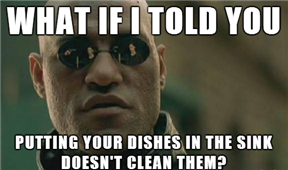What…
Living with roommates is hard. Currently, as I write this blog, there is a pile of dishes in my sink, filled with remnants of now moldy cereal and pasta, as shown in the image to the left. My roommate, Sarah’s dishes have been sitting in the sink for six days and counting. My other roommate, Emma, and I have tried asking her to clean her dishes immediately after she is finished cooking or eating, however Sarah does not listen. In addition, trying to con front Sarah about the problem is extremely challenging because she becomes very defensive and says things likes “well, I have cleaned multiple dishes in the past with food in them that were not mine.” She does not want to even consider or accept that her behavior is bothersome and disrespectful to Emma and I, who always take the time to be responsible for our own dishes. I remember on another particular occasion, I informed Sarah one week in advance that I was going to have friends over; therefore she had time to prepare and make accommodations as well. However, the day of the gathering, the sink was filled with dirty dishes that had been sitting there all weekend. When I decided to confront her, making sure I chose the right words and tone, she began criticizing me on other irrelevant problems. I became so angry and frustrated that I decided to leave it alone and live with her messiness.
front Sarah about the problem is extremely challenging because she becomes very defensive and says things likes “well, I have cleaned multiple dishes in the past with food in them that were not mine.” She does not want to even consider or accept that her behavior is bothersome and disrespectful to Emma and I, who always take the time to be responsible for our own dishes. I remember on another particular occasion, I informed Sarah one week in advance that I was going to have friends over; therefore she had time to prepare and make accommodations as well. However, the day of the gathering, the sink was filled with dirty dishes that had been sitting there all weekend. When I decided to confront her, making sure I chose the right words and tone, she began criticizing me on other irrelevant problems. I became so angry and frustrated that I decided to leave it alone and live with her messiness.
So What…
My experience reminds me of the Conflict Resolution section in The Emotionally Intelligent Team. In the book, authors Marcia Hughes and James Bradford Terrell present five conflict resolution styles: avoiding, accommodating, comprising, competing and collaborating. Reflecting on my experience, after a failed confrontation with Sarah about her dishes, I decided to avoid the situation and accommodate by buying more dishes for myself to use. However, after reading Conflict Resolution, I realize that I may not have handled the situation in the best possible way. I directly expressed to Lindsay how I was feeling and did not bother to understand her perspective and ask why she was unable to do the dis hes. In my mind, I was listing all the possible excuses she could make and then countered them through a direct comparison to myself, thinking “well I’m busy too especially since I am taking way more credits than you are so that’s not excuse.” In other words, I never bothered to actively listen to Sarah and genuinely understand why she has not been doing her dishes. If I had listened to her side of the story, we may have been able to come up with an accommodating solution that worked well for both of us.
hes. In my mind, I was listing all the possible excuses she could make and then countered them through a direct comparison to myself, thinking “well I’m busy too especially since I am taking way more credits than you are so that’s not excuse.” In other words, I never bothered to actively listen to Sarah and genuinely understand why she has not been doing her dishes. If I had listened to her side of the story, we may have been able to come up with an accommodating solution that worked well for both of us.
So Now What…
I honestly do not know how to handle the situation now because Sarah seems to be more irritated with and distant from me. I asked my other roommate, Emma, to talk to Sarah since they have a closer relationship. Specifically, though, I advised Emma to actively listen (using some tips I found in a web article called, “Active Listening”), to Sarah ’s point of view before she confronts her. Essentially, I asked Emma to listen to Sarah’s perspective first, to gain a better understanding of all the things that are going on in her life that may interfere with her not being able to do the dishes. Emma could help Lindsay find ways to alleviate or provide temporary relief from the issues or the stressors in her life, then maybe we could develop a plan for Lindsay to take care of her dishes immediately in the future. Will this method work? I have no clue. The only person to change Sarah is Sarah herself; neither Emma nor I can make Sarah ch
’s point of view before she confronts her. Essentially, I asked Emma to listen to Sarah’s perspective first, to gain a better understanding of all the things that are going on in her life that may interfere with her not being able to do the dishes. Emma could help Lindsay find ways to alleviate or provide temporary relief from the issues or the stressors in her life, then maybe we could develop a plan for Lindsay to take care of her dishes immediately in the future. Will this method work? I have no clue. The only person to change Sarah is Sarah herself; neither Emma nor I can make Sarah ch ange. I can only hope the conversation tomorrow will have a stronger impact as opposed to a direct confrontation.
ange. I can only hope the conversation tomorrow will have a stronger impact as opposed to a direct confrontation.